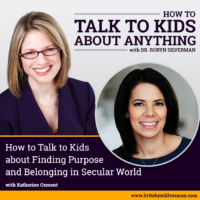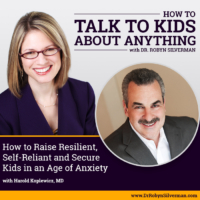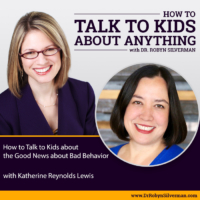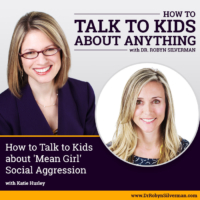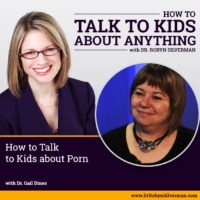Podcast: Play in new window | Download
Subscribe: Apple Podcasts | RSS | More
How to Talk to Kids about Meaning & Purpose in a Secular Age
This podcast focuses on talking to kids on talking to kids about finding meaning, connection and purpose even if they are not raised in a religious family—or if they are raised in a family without religion at all. Tips and scripts are provided by our guest, Katherine Ozment, author of Grace without God.
Special Guest: Katherine Ozment
Studies continually show that people who are raised with religion are show that happier, healthier and more giving, and have a strong sense of connection to their past and community. Most Americans are raised with some kind of religion and yet, many have started to leave the religion they grew up with for many different personal reasons. But if religion makes us happier, healthier and more connected, how do people cope with the void left after leaving their religion? And what happens to the kids who are raised without religion?
Katherine Ozment is the author of Grace Without God: The Search for Meaning, Purpose, and Belonging in a Secular Age. She is an award-winning journalist who has worked in publishing for more than twenty-five years, including as a senior editor at National Geographic, for which she once rode a donkey through the desert of Israel and Jordan for several weeks. Her essays and articles have been widely published in such venues as National Geographic, The New York Times, and Salon. Grace Without God was named a best book of the year by Publishers Weekly and Spirituality & Health. I’m not surprised because it is beautifully written and thought provoking. You can learn more about Katherine and her book in the show notes of this podcast as well as on her website www.katherineozment.com
The podcast provides:
- What it means to be a “none” and why their numbers are rising so dramatically.
- What the unique challenges are of raising children outside the religious framework.
- How to answer some of life’s biggest questions without the framework of religion and the religious stories to provide the answers.
- How science and nature provide answers to many deep questions.
- How to ensure children have a sense of belonging and purpose when they are not involved in religion.
- Tips on how to ensure our children feel a sense of belonging and purpose no matter what their religious involvement is in this day and age.
- Scripts of how to talk to kids about these tough topics and questions.
Important Messages:
- In the late 1980s, the number of people who checked “none of the above” when choosing which religion they assigned themselves to started to rise. The Pew foundation has found that about 20% of people now consider themselves part of the “nones” (now about 25%) The number is still rising. Among them, 33% of millennials define themselves this way (now about 40%).
- This changing dynamic has changed parenting.
- How are parents, these days, making sense of the things religion used to help us make sense of?
- A lot of people are leaving all sorts of institutions. This creates freedom- there’s a real liberation but when we leave, we lose a lot of support and connection- this creates a big challenge.
- Religion has brought people together with a sense of belonging, rituals and being connected to something larger than ourselves that gives us meaning.
- We can’t ignore our children’s questions simply because we can’t answer them for ourselves.
- It’s important to give our children options- to believe or not to believe- that their way is okay even if it’s different than their mother. There is more than just one way.
- You can use nature and science to provide another possible avenue for answers.
- When someone has an awe experience, time slows down. They are more grateful.
- There are many ways to experience awe. You can get it from religion but you can also get it in nature or with people, doing some wonderful thing. We can have it in a simple moment.
- Those who are fully involved in the religious community (go to the potluck, the book club, etc.) vs. those who are not involved and simply sit in the back, have very different experiences in terms of happiness and long life. Connectedness is very important.
- Find people who share some of your values and create community with them (listen to Katherine’s story about the secular Shabbat).
- In research (see Rick Weissbourd of Making Caring Common and his podcast with us as well), parents say they want their kids to be good people but the kids say their parents want them to do well academically. Are we walking our talk? Are we conveying that we want our kids to be kind people—and if so, how?
- Let’s get back to a communal mentality and find out from our children how they are going to contribute to the community- what gifts will help others?
- We need to look at religion and notice what we’ve gotten from it- there are many wonderful things about religion. “Don’t throw out the baby with the bathwater.” What are people lacking if they don’t have religion and what should they seek out?
Notable Quotables:
- “Newly secular parents, raising secular kids when they, in fact, were raised religiously, are having to create what religion provided: A sense of belonging, rituals and being connected to something larger than ourselves that gives us meaning. They are having to look outside religious institutions to do it.”
- “We were raising our children secular without much thought. But when my child asked me what we were, I decided that I needed to raise my children secular with much thought.”
- “Part of the journey parents should take is one within themselves to decide what is it that you believe.”
- “Questions beget questions. One question leads to another question as we continue to try to untangle life’s mysteries.”
- “None of us really know, for sure, the answers to life’s questions—so why not legitimize that to our children? So that when they ask, it’s OK not to say “absolutely this!” or “absolutely that!” It’s okay to live in the questions.”
- “The importance of life is the time we are here on Earth—that is all we know that we can control.”
- “To live forever is to live through the way you affect others. The way you are in community and family and in the things that you do in your life is heaven on Earth in a way. It is how we pass on our lives and the meaning of our lives to others.”
- “If we can stop ourselves and let ourselves notice these moments of awe, we feel deeply connected to the life cycle, to the world, to nature and to other people. This is how to live a meaningful life and how to help your children feel that they are part of something bigger than themselves.”
- “Start telling your children stories about their ancestors. Stories of struggle. Stories of success. Stories of having to work really hard. There’s research about the intergenerational self—a sense a child has that they are part of a long line of people. They are not just some random person floating around in 2018. They actually come from a long line of people who worked really hard to get here and passed certain things down through the family line. Kids who have a stronger intergenerational self are more resilient when faced with challenges in their lives.” (Marshall Duke, Emery University)
- If you are being raised in a religious household, you might be able to call on Judaism or Mormonism of whatever that faith is that you have to get whatever kind of multigenerational self and feel that you are part of this rich history. For kids who are raised without religion, it’s got to come from a different source so we can look at our ancestors so that know that they are not alone.”
- “Human nature is that we love to belong.”
- “Find people who share some of your values. Figure out ways that you can create these communities of shared values.”
- “It’s key to create a feeling of sacredness. This is something we do and we’re not going to stop doing it.”
- “Religions thrived through the millennia because people were willing to pay the cost in time to do the rituals and sit there and there was a pay off for that. There were all these people and there were all these rituals but there was a trade off. It doesn’t come without effort.”
- “Your life is a privilege and you should live it well.”
- “Make time for awe and wonder in your life. If you do that, your life will be more meaningful.”
- “If you seek work in connections that give you a sense of being larger than just yourself, then your life will have purpose.”
- “Instead of talking about a label, let’s talk about what’s underneath labels. Let’s talk about what it means to be a human being who’s thinking and questioning and striving to be a better person.”
- “Can you boil down, in 10 items, what you really want your kids to know?”
- “At the final coming of age ceremony in Northern California of a group of teenagers, they asked 2 questions; what is the thing about you that makes you unique? And what is your gift to the world?”
- “When you’re living in the questions, you are living a curious life, potentially full of wonder because everything you see is an opportunity for growth. Everything you see is an opportunity for connection.”


